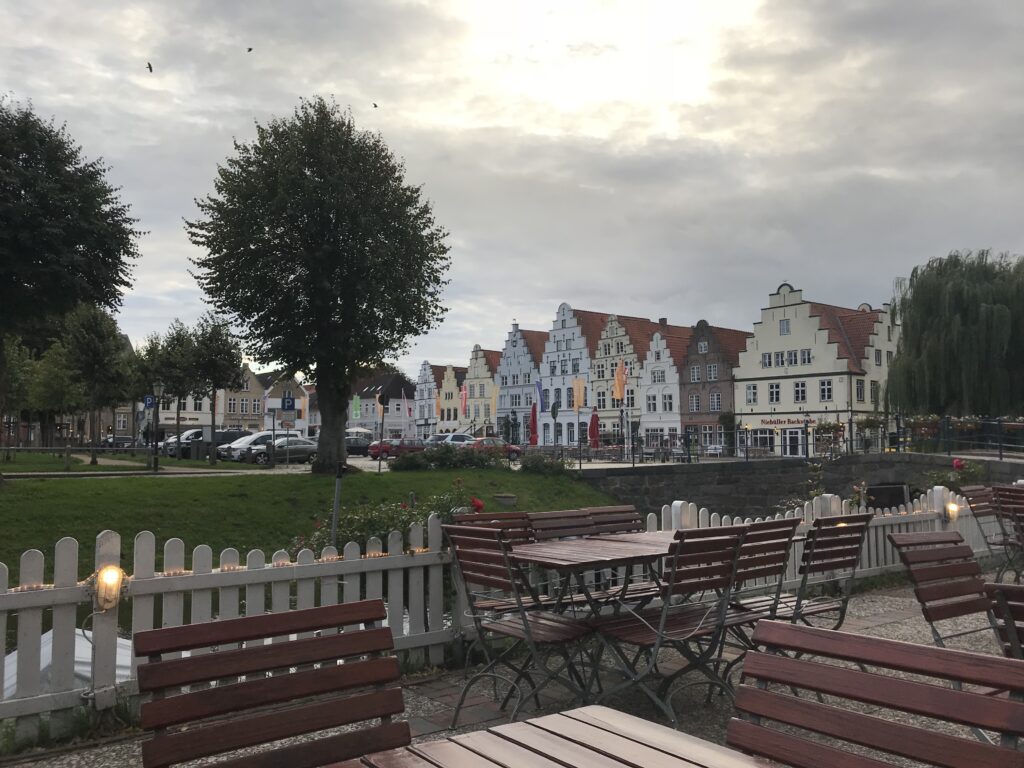
If I had a gold coin for every time I was out detecting and someone asked me “Do those things really work”? I’d have retired long ago.
I’m always polite and enthusiastic with my responses to questions or comments, after all, it is Metal Detecting. What detectorist doesn’t like to talk about that? But, after years of being asked the same question over and over again, forgive my imperfection, but just once, I wish I had the nerve to respond with “No, they don’t work at all. I just love scanning the ground all day in my silly little world of metal detecting make believe”.
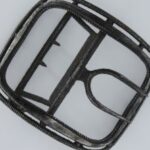 Despite the sarcasm in that response, there is a bit of truth to it. Detectorist’s do have to possess a good imagination to a certain degree. Being successful in the hobby long term isn’t achieved by digging up 250 year old relics, thinking oh, geez it’s another old shoe buckle, how lame… I’ll just throw that in the junk bucket. Every old coin, relic, or piece of jewelry has a history, and as humans the majority of us have always been a bit obsessed with the past.
Despite the sarcasm in that response, there is a bit of truth to it. Detectorist’s do have to possess a good imagination to a certain degree. Being successful in the hobby long term isn’t achieved by digging up 250 year old relics, thinking oh, geez it’s another old shoe buckle, how lame… I’ll just throw that in the junk bucket. Every old coin, relic, or piece of jewelry has a history, and as humans the majority of us have always been a bit obsessed with the past.
If you’ve ever enjoyed a visit to a historic site or museum, dabbled in genealogy, or spent an evening engrossed in the History channel, that’s proof right there. These places and TV programs exist, because people have an interest in them. People don’t trace their family trees or hunt for relics because it’s lame, they do it to understand and connect to those who came before them.
Maybe it’s in our DNA. After all, the cells in our bodies came from our ancestors. Cells have memory, and maybe those memories get triggered somehow when we uncover an item, learn a fact, or view scenes from the past. There’s something almost instinctive that drives us to know more about it, and when we don’t know, or can’t find out, we resort to our imaginations.
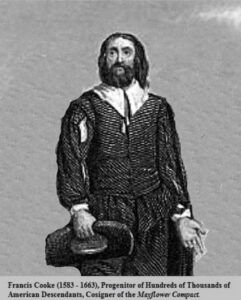 I always had an insatiable desire to know more about my family history. I thought it was probably because I was adopted, but as I got older I realized it was just an ingrained need to know. Before I got into metal detecting, my hobby was genealogy, and I put just as much effort into my adoptive family tree as I did in my natural family tree. Maybe even more so. A decade or so of research (and before ancestry.com), brought many things to light. On my (natural) paternal side, my two 9th Great Grandfather’s Francis Cooke & Stephen Hopkins came over on the Mayflower. Their children intermarried (making Francis & Stephen both 9th Gr. Grandfathers). And then their daughter married John Doty (who’s father also came over on the Mayflower as Stephen Hopkins servant), adding another Mayflower descendant to my tree. So with all that historic DNA floating around inside me, it’s no surprise as to why I acquired a preference for hunting colonial quite early on in the hobby.
I always had an insatiable desire to know more about my family history. I thought it was probably because I was adopted, but as I got older I realized it was just an ingrained need to know. Before I got into metal detecting, my hobby was genealogy, and I put just as much effort into my adoptive family tree as I did in my natural family tree. Maybe even more so. A decade or so of research (and before ancestry.com), brought many things to light. On my (natural) paternal side, my two 9th Great Grandfather’s Francis Cooke & Stephen Hopkins came over on the Mayflower. Their children intermarried (making Francis & Stephen both 9th Gr. Grandfathers). And then their daughter married John Doty (who’s father also came over on the Mayflower as Stephen Hopkins servant), adding another Mayflower descendant to my tree. So with all that historic DNA floating around inside me, it’s no surprise as to why I acquired a preference for hunting colonial quite early on in the hobby.
I didn’t find all this family history out until I was in my late twenties, but it explained so much. I always had an affinity for the Cape Cod area, with Plymouth being my favorite town. Before it closed, the Plymouth Wax Museum was my “go to” attraction. I must have gone there at least a dozen times, being ever so fascinated with the displays. I was also fascinated with the Pilgrim Hall & Mayflower House Museums. Revisiting them a few years ago, just to view some of my ancestors belongings, and to hear their stories again.
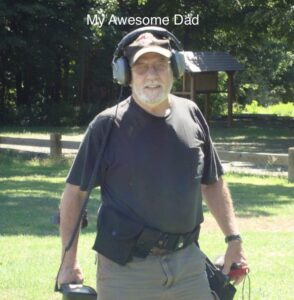
So with the paternal roots of my natural and adoptive families settling in the same area of Massachusetts, I always had a feeling that somewhere in the two family trees, with the thousands of people in them, the lines crossed at some point. I felt sure I would someday find out that my (adoptive) father actually was a blood relative. Unfortunately, even though some of the surnames were the same, I never did find the link. But it doesn’t matter, to me we’re related whether I ever find that link or not. My Dad truly is my Dad, and he’s pretty awesome to boot.
My genealogy also revealed dozens of relatives who fought in the Civil and Revolutionary Wars. I obtained a copy of my 2nd Great Grandfathers pension file, which gave a history of his service, battles he fought in, and wounds received. He was a participant in the infamous “Battle of the Wilderness”, and sustained a wound from this battle, in addition to being wounded in other battles as well.
No one in the family seemed to know anything about him, or his service. There were a few folks that remembered who he was, but didn’t know much about him other than he had existed. It was a rude awakening for me, with my obsession for the past, to accept that some people don’t care about such things. I wondered perhaps if these brave ancestors knew that within a hundred or so years they would all but be forgotten, would they have still risked their lives fighting for their beliefs?
Excerpt from the medical records in my 2nd Gr. Grandfathers Pension file (question marks are inserted where it’s illegible):
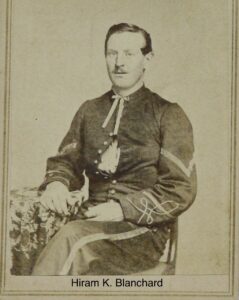 “ H.K. Blannchard ? wounded, May 5, 1864; treated as, Hiram K. Blanchard? May 12 to 14,1864 contusion R. thigh 1\2 inch above the knee; May 15 to 29, 1864, Centered wound of right knee, wounded at Wilderness May 5, 1864, furloughed. and from June 17 to July 11, 1864, returned to duty: July 18th to Aug 8, 1864 Nephritis, returned to duty: as H K Blanchard, P. co B ? wounded in hand slight at the battle of Winchester, VA Sept 19, 1864: Treated as H. R. Blanchard: ? Sept. 19, 1864 forefinger severed by shell, R. Hand: as H K Blanchard ? Sept 1864 Gunshot wound Rt hand. Sept 25 to 26, 1864, G S.W. right finger: as hiram K. Blanchard, ? c, Sept 27 to Oct 13, 1864 G.S. flesh wound right forefinger. Oct 15 to Nov 21 1864 ???? G.S. flesh wnd up Extr, returned to duty: as Hiram Blanchard ?. examined by medical board for transfer to V.R.C. jan 9, 1865, Permanent extension of right index finger from wound and varicocele: treated Jan 6 to 12, 1865, Syphilis, transferred to ? C. as __Blanchard, Rank _????. 14 V.R.C.Jan 26 to Feb 29, 1865, (no diagnosis) Mch 1 to 16, 1865 (no diagnosis) as henry K. blanchard, H.K. Blanchard & Hiram Blanchard?, Mch 22 to Apr 7, 1865, She?? of face, furloughed, and f? May 9 to Aug 15, 1865 returned to duty. Nothing additional found”
“ H.K. Blannchard ? wounded, May 5, 1864; treated as, Hiram K. Blanchard? May 12 to 14,1864 contusion R. thigh 1\2 inch above the knee; May 15 to 29, 1864, Centered wound of right knee, wounded at Wilderness May 5, 1864, furloughed. and from June 17 to July 11, 1864, returned to duty: July 18th to Aug 8, 1864 Nephritis, returned to duty: as H K Blanchard, P. co B ? wounded in hand slight at the battle of Winchester, VA Sept 19, 1864: Treated as H. R. Blanchard: ? Sept. 19, 1864 forefinger severed by shell, R. Hand: as H K Blanchard ? Sept 1864 Gunshot wound Rt hand. Sept 25 to 26, 1864, G S.W. right finger: as hiram K. Blanchard, ? c, Sept 27 to Oct 13, 1864 G.S. flesh wound right forefinger. Oct 15 to Nov 21 1864 ???? G.S. flesh wnd up Extr, returned to duty: as Hiram Blanchard ?. examined by medical board for transfer to V.R.C. jan 9, 1865, Permanent extension of right index finger from wound and varicocele: treated Jan 6 to 12, 1865, Syphilis, transferred to ? C. as __Blanchard, Rank _????. 14 V.R.C.Jan 26 to Feb 29, 1865, (no diagnosis) Mch 1 to 16, 1865 (no diagnosis) as henry K. blanchard, H.K. Blanchard & Hiram Blanchard?, Mch 22 to Apr 7, 1865, She?? of face, furloughed, and f? May 9 to Aug 15, 1865 returned to duty. Nothing additional found”
About a decade ago, I was lucky enough to be able to hunt private property in Virginia where the Battle of the Wilderness took place. It was one of the strangest personal experiences I’ve ever had while detecting. From the moment I started swinging my machine, all I could do was think about my Gr. Grandfather, and what he encountered there. I imagined the “Rebel Yell” as I had heard it described, and knew that he had probably been privy to it first hand. I was overwhelmed with emotions, so much so, that I actually had to sit down and take a break next to the river for a while just to bring myself back to reality.
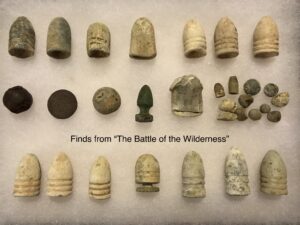 I finally gathered my emotions and managed to find a dozen or so bullets, a musket ball, grapeshot, and a few other relics. And with every recovery, I wondered if my ancestor dropped that bullet, shot that bullet, or was shot at by that bullet. It was surreal to be sure, but it also made me feel like I now had a connection to him, and I felt a bit of closure towards the mystery he was.
I finally gathered my emotions and managed to find a dozen or so bullets, a musket ball, grapeshot, and a few other relics. And with every recovery, I wondered if my ancestor dropped that bullet, shot that bullet, or was shot at by that bullet. It was surreal to be sure, but it also made me feel like I now had a connection to him, and I felt a bit of closure towards the mystery he was.
He survived the war with several gun shot wounds, and returned home to live out the rest of his life. Unfortunately though, as fate would have it, his death was ultimately caused by the Mercury used in treating the syphilis he contracted during the war. A sad ending for a brave soldier.
And what family tree would be complete without a witch? Of course mine had one of those too. I didn’t want to believe it, but it’s true. My 8th Gr. grandmother was accused by her grandson and convicted. I cannot even bring myself to imagine her horror at having her own family condemn her.
Here is an excerpt from the account:
In spite of her protesting her complete innocence, she was found guilty and sentenced by the governor on May 27th as follows: “Elizabeth MORSE, you are to goe from hence to the place from when you came and thence to the place of execution and there to be hanged by the neck, till you be dead, and the Lord have mercy on your soul.” 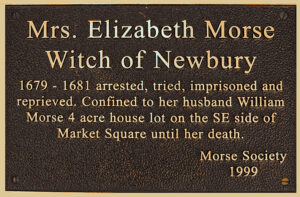 Then, for some unexplained reason, Elizabeth was granted a reprieve on June 1, 1680 by Governor BRADSTREET. The deputies of the local court did not agree with the decision, however, and complained in Nov 1680 to have the case reopened. Testimony was again heard in the general court through May 1681. William sent several petitions pleading his wife’s innocence and attempting to answer the hysterical allegations of 17 Newbury residents who submitted testimony in writing offering their reasons why they had concluded that Goody MORSE must be a witch and should be hung according to old Mosaic law. Reading the list of “reasons” today quickly strikes the 20th century mind as a dredging up of every petty annoyance, every grudge or neighborhood misunderstanding the townspeople could think of from sick cows to being snubbed in public. It was owing to the firmness of Gov. BRADSTREET in his initial decision that the life of Elizabeth MORSE was saved and the town of Newbury prevented from offering the first victim in Essex County to the witchcraft hysteria. Later town records and other contemporary sources fail to record what happened to the “vile and roguish” grandson whose attempts to torment his elderly grandparents nearly resulted in his grandmother’s untimely death.
Then, for some unexplained reason, Elizabeth was granted a reprieve on June 1, 1680 by Governor BRADSTREET. The deputies of the local court did not agree with the decision, however, and complained in Nov 1680 to have the case reopened. Testimony was again heard in the general court through May 1681. William sent several petitions pleading his wife’s innocence and attempting to answer the hysterical allegations of 17 Newbury residents who submitted testimony in writing offering their reasons why they had concluded that Goody MORSE must be a witch and should be hung according to old Mosaic law. Reading the list of “reasons” today quickly strikes the 20th century mind as a dredging up of every petty annoyance, every grudge or neighborhood misunderstanding the townspeople could think of from sick cows to being snubbed in public. It was owing to the firmness of Gov. BRADSTREET in his initial decision that the life of Elizabeth MORSE was saved and the town of Newbury prevented from offering the first victim in Essex County to the witchcraft hysteria. Later town records and other contemporary sources fail to record what happened to the “vile and roguish” grandson whose attempts to torment his elderly grandparents nearly resulted in his grandmother’s untimely death.
Thankfully, she was later reprieved, but I’m sure she carried those scars for the rest of her life.
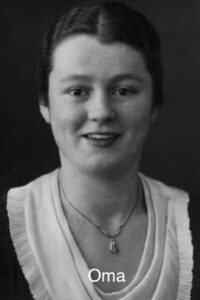 I’m also lucky to know my birth mom (some adoptees don’t have that), and my natural family in Germany, and especially grateful for the relationship I had with my “Oma” (grandmother). Before her death, I would visit her in Germany once or twice a year.
I’m also lucky to know my birth mom (some adoptees don’t have that), and my natural family in Germany, and especially grateful for the relationship I had with my “Oma” (grandmother). Before her death, I would visit her in Germany once or twice a year.
After my arrival, the first few days were always the same. “Oma” would make my favorite meal, Bratwurst and kartofeln (potatoes). Sounds kitschy and Americanish, but bratwurst from a German festival or Oktoberfest in the US, is more like a hotdog, and nothing at all like bratwurst fresh from the butcher in Northern Germany, cooked by a professional Oma. The taste, and the company just can’t be imitated.
The next day was the walk about town, arm in arm with her. Not because she was unsteady, but because of our connection. She would take me to the butcher, post office, bank, grocery store, etc… all the while pointing out different buildings she had lived in, once owned, or knew something about. She would also tell me the German word or phrase for anything I didn’t know, and was the key to my success in the language. All the years I spent in German classes felt like wasted time, because I couldn’t always recall a vocabulary when I needed it, but if Oma taught me a word or phrase I never forgot it.
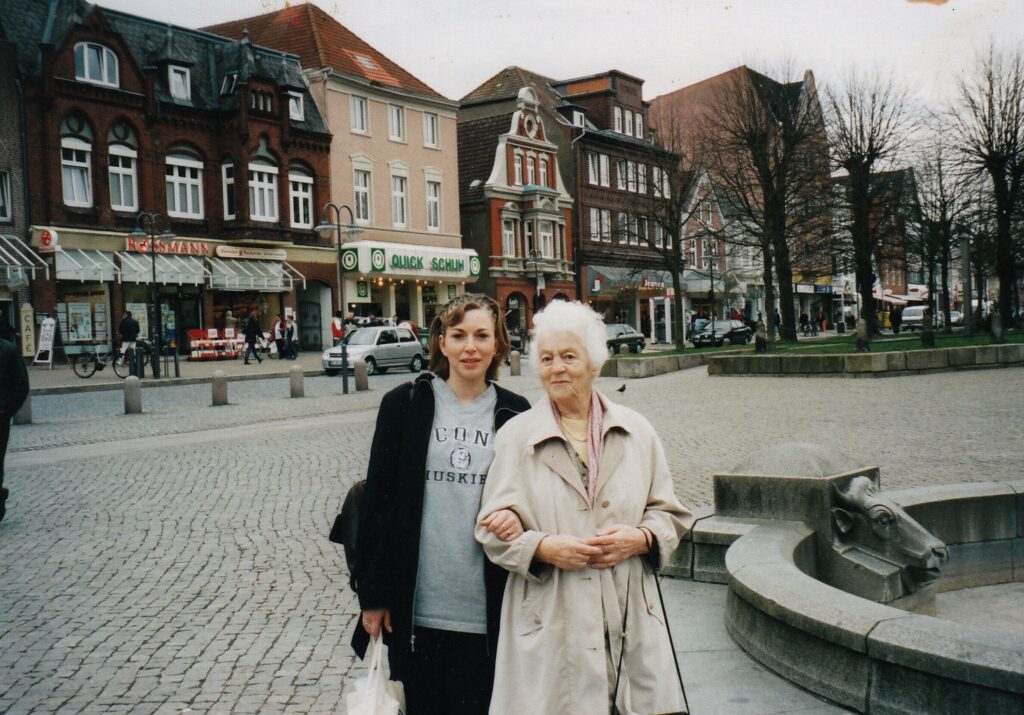
After the walkabout, the photo albums would usually come out. These weren’t the 1980’s sticky plastic page full color albums. These were my ancestors albums. Hard bound, Black and white pics on stiff black paper, with the little corners pasted on them to hold the photos in place. The photos went back into the 1800’s, with everyone’s names clearly written below. Oma would go over each page, and tell me who everyone was, where they lived, and a bit about them. On one of my last visits I had the foresight to have copies of most of the pictures made, and took notes to preserve the history for future generations.
My Oma never met her father, as he died before she was born during World War I, and is buried somewhere in Poland. She had a brother who she was very close to, who died in World War II, and up until 2010, still had his uniform hanging in her closet. One emotional afternoon, she took me upstairs to see it, along with the other old military buttons, medals and antique paraphernalia stowed away in an old box in the back of one of the dresser drawers.
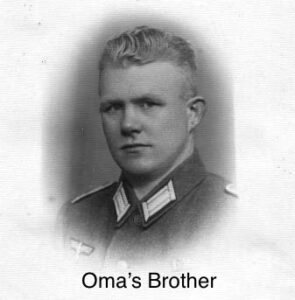 There is a stigma associated with anything from WWII (and for good reason) that I am keenly aware of. If I was viewing that uniform in a museum, I would instinctively associate it with the Holocaust. However, despite my Jewish ancestry, viewing it in my grandmothers closet, and seeing the look on her face brought up conflicting emotions, mostly sadness. I sensed it wasn’t just his death that pained her, but I didn’t pry.
There is a stigma associated with anything from WWII (and for good reason) that I am keenly aware of. If I was viewing that uniform in a museum, I would instinctively associate it with the Holocaust. However, despite my Jewish ancestry, viewing it in my grandmothers closet, and seeing the look on her face brought up conflicting emotions, mostly sadness. I sensed it wasn’t just his death that pained her, but I didn’t pry.
There is an unwritten rule in German culture, that you don’t talk about the war. As if somehow ignoring it will make it go away. It’s an embarrassing chapter in the country’s history, and even though I’m well versed in the culture, I always thought this attitude towards it was just plain stupid—but whether out of ignorance or shame, that is how a lot of folks of that generation chose to deal with it.
Fortunately, my grandmother was a progressive, realistic woman, who told it like it was (to me at least). Unlike some of her elderly friends, she no longer feared the Government, and spoke freely to me about her experiences. She told me many things that are personal and I won’t share here. But she also told me that like so many young men of that era, my Uncle didn’t want to go to war. He had a fiancé, they were planning to get married, raise a family, and live a normal life. Sometimes you have to fight, even if you don’t believe in what your fighting for, and sometimes the tragedy of loss is not just the loss itself, but the circumstances surrounding it.
Fortunately my family lived in an area that was not heavily bombarded, with only a few bombs landing there during the whole of WWII. One of them did, however, fall on the house next door, and all my mother remembers is her father screaming at her to “get down” as it fell. I try to imagine myself with my son when he was small, being in her place, and the fear my mother and her parents must have felt during those times.
I made mental notes on all the stories my Grandmother told me. Like the one about an uncle, who was wounded on the Russian Front, and carried out of there on a cart by his best friend. At the time they were both still alive, and still got together regularly. She took me to meet him, and as I looked at this elderly gentleman sitting in a chair, I thought about what he had experienced in his life. Being raised feeling safe and unthreatened, it was hard to grasp that these events had occurred not so long ago.
I wondered too, what this elderly man thought of me. This young woman sitting in front of him, without a care in the world—visiting from America, and who’s worst tragedy in life was probably a broken heart. Speculating aside, I have no idea what he was really thinking, I just know that in his presence my world felt small.
And I believe it was more than a trip down memory lane for my grandmother. I think it was her way of teaching me about the past so it would not be forgotten. There was a reason she held onto the uniform, and kept the box in the drawer. Good or bad, it was her connection to the past. She knew I had a passion for it, and that’s why she showed it to me. Even though we didn’t always understand each other, we always understood each other.
These family stories are sobering, but it also reminds me that there is a real history attached to all these relics and coins that we unearth. These items were lost by real people with lives and families, and hardships of their own. This is what I think of when I find an old coin, relic, or military artifact.
When I’m staring at an old cellar hole, I can’t help but imagine the Pioneer’s who built it. If I unearth a colonial flat button, I often wonder about the person who lost it. Following stone walls makes me think about the farmer who made his living off the land. They are the remains of those who came before us. That’s why we try to preserve them rather than tossing them in the junk bucket.
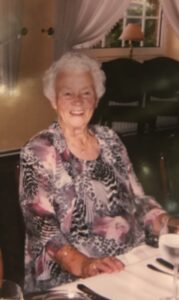
Sadly my Oma passed away, and I could not attend the funeral because of a snowstorm that grounded all flights, which was very upsetting. And although she had promised to leave me that old box, and photo albums, I never did receive them. I inquired as to their whereabouts, and no one seemed to know or really care what happened to them, or how important they were to me.
In retrospect, I’m thankful I had the interest and foresight to take notes and make copies of the old photos, and that my grandmother realized that it would be me who would keep those memories alive.
And now I’m an Oma myself. I choose to be called “Oma” not just because of my heritage, but also out of a deep respect for my grandmother. A woman who lived through two World Wars that took her father, her brother, and many others who were close to her. And although I sensed she was deeply wounded by all the events and loss in her life, she remained the epitome of love and grace right up until the very end.
So when you’re out there in the field and dig up an old relic, don’t forget to use your imagination and acknowledge the people and events of the past. It’s the past that makes one truly appreciate the present, and have hope and faith for the future.
Happy Hunting.


Wow, that was fantastic read. I especially loved –
“Even though we didn’t always understand each other, we always understood each other…..”
Thanks for making my day….
You’re welcome, and your nice comment made my day too! Yup, Oma and I had a special connection. I’m sad she’s gone, but lucky to have had her.
Great story Allyson.
Thanks Jeff—hoping to find some more great history with you guys in 2021!
Hi Allyson:
I’m with ole Stouty on this one. An absolutely fascinating read. I presume the Witch, Elizabeth Morse of Newbury, refers to the Newbury in Berkshire UK. Interestingly, she was sentenced to death by hanging, rather than the usual punishment of being burned at the stake.
Great read.
Thanks John. When you can’t be out hunting, it makes for more creative writing. The witch was from Newbury, Massachusetts—sorry. Us Americans stole all those UK town names back in the day. Must of reminded them of home.
Thanks for clearing that one up. There are hundreds of towns in the New England area as you know, named by the early settlers. When you search these areas you have to search them in the same ways as we do in the UK. Never miss a dry-stone wall, or an old orchard. Both a cache sites.
I look forward to your next post.
Great story. Thanks for sharing. You are so lucky to have had such quality time with your Oma.
Yes, I’m so glad for the time we had together and all she shared with me. Thank you for your comments and for stopping by—Happy Hunting!
Love this blog post, Allyson. I too feel a strong connection between genealogy and detecting. Let’s hope our ancestors lead us to some great finds this year!
I’m glad you liked the post. Genealogy and detecting do seem to have connection. I think it might be because it all involves searching. I don’t think our ancestors could have imagined us out at old cellar holes, with machines in our hands looking for traces of what they left behind.
You are still the last person I detected with, and I’m really babying my arm so that when I do get up to NH I’ll be ready. I’m so looking forward to it—see you soon.